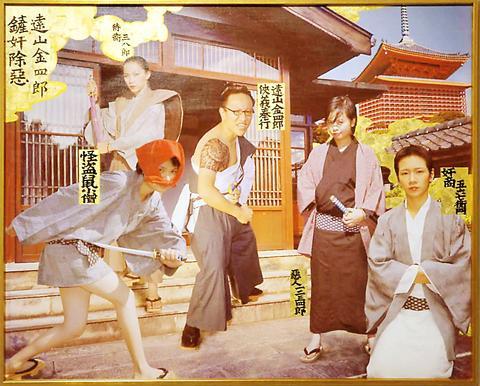Spellbound Aura is not just a photography exhibition. It is an exhibition about photography, all its possibilities and its influences on other media," said Yao Ruei-chung (姚瑞中), co-curator of Spellbound Aura: The New Vision of Chinese Photography (出神入畫: 華人攝影新視界) currently on show at the Museum of Contemporary Art, Taipei (台北當代藝術館).
As the difference between photographers and artists have blurred, the exhibition includes sculptures, installations, videos and an oil painting. Yao teamed up with Zhu Chi (朱其) in selecting working from 25 artists from China, Taiwan and Hong Kong to show the latest developments in photography in the greater-Chinese world.
"In photography, anything is possible these days. There is unlimited freedom but also greater challenges," said Huang Tzi-chin (黃子欽), an artist at the show.

PHOTO COURTESY OF MOCA
"All the three places [China, Taiwan and Hong Kong] have developed into matured economies and all the artists have become versed in digital images and made use of performance art concepts in their works. This exhibition is aimed at presenting these trends in the greater-Chinese world," Zhu said.
Photographers from the two sides of the Taiwan Strait may both use similar technologies and share an inclination toward carefully staged tableaus, but their artistic expressions and subject matters are different.
Zhu sees strong personal styles in the works of young Taiwanese artists. Chen Ching-yao (陳擎耀) and Lee Shih-yi (李詩儀), who, for example, deal with sex and imported Japanese pop culture respectively in narrative photo series that starred themselves in costumes. Their colors are more "groovy" and their moods are hedonistic, Zhu said.
Chinese artists appear more concerned with the clash between traditional culture and modern life. Miao Xiaochun (繆曉春), for example, dresses up as Confucius walking through the streets of one of China's tens of thousands of medium-size cities. He walks past a sculpture factory, filled with large statues of ancient Chinese and Roman personalities. The sculptures stand in awkward contrast with the gray electric poles and shabby shops next to the factory. Miao's Confucius seems fragile and out of place in the dirt-co-lored landscape.
"China is changing fast into a commercial society. Everyone is seeking fast money. Manufacturers produce sub-standard goods to cater to the fast-expanding market. The products are sometimes so badly made that even the manufacturers cannot stand them. Roman statues are one of the fashionable products churned out to cater to the consumers of cheap glamor," Zhu said, explaining the background of Miao's work.
"The fast pace of China's social, economic and cultural changes have been a weighty issue that calls out for artists to deal with. In recent years, artists have changed too. They have realized that these changes are irrevocable and may not necessarily be negative. They just want to point out the issues without expressing their stance on them," Zhu said.
Spellbound Aura: The New Vision of Chinese Photography will run through May 2 at Museum of Contemporary Art, Taipei, 39 Changan W Rd, Taipei (台北市長安西路39號).

On April 26, The Lancet published a letter from two doctors at Taichung-based China Medical University Hospital (CMUH) warning that “Taiwan’s Health Care System is on the Brink of Collapse.” The authors said that “Years of policy inaction and mismanagement of resources have led to the National Health Insurance system operating under unsustainable conditions.” The pushback was immediate. Errors in the paper were quickly identified and publicized, to discredit the authors (the hospital apologized). CNA reported that CMUH said the letter described Taiwan in 2021 as having 62 nurses per 10,000 people, when the correct number was 78 nurses per 10,000

As we live longer, our risk of cognitive impairment is increasing. How can we delay the onset of symptoms? Do we have to give up every indulgence or can small changes make a difference? We asked neurologists for tips on how to keep our brains healthy for life. TAKE CARE OF YOUR HEALTH “All of the sensible things that apply to bodily health apply to brain health,” says Suzanne O’Sullivan, a consultant in neurology at the National Hospital for Neurology and Neurosurgery in London, and the author of The Age of Diagnosis. “When you’re 20, you can get away with absolute

May 5 to May 11 What started out as friction between Taiwanese students at Taichung First High School and a Japanese head cook escalated dramatically over the first two weeks of May 1927. It began on April 30 when the cook’s wife knew that lotus starch used in that night’s dinner had rat feces in it, but failed to inform staff until the meal was already prepared. The students believed that her silence was intentional, and filed a complaint. The school’s Japanese administrators sided with the cook’s family, dismissing the students as troublemakers and clamping down on their freedoms — with

As Donald Trump’s executive order in March led to the shuttering of Voice of America (VOA) — the global broadcaster whose roots date back to the fight against Nazi propaganda — he quickly attracted support from figures not used to aligning themselves with any US administration. Trump had ordered the US Agency for Global Media, the federal agency that funds VOA and other groups promoting independent journalism overseas, to be “eliminated to the maximum extent consistent with applicable law.” The decision suddenly halted programming in 49 languages to more than 425 million people. In Moscow, Margarita Simonyan, the hardline editor-in-chief of the